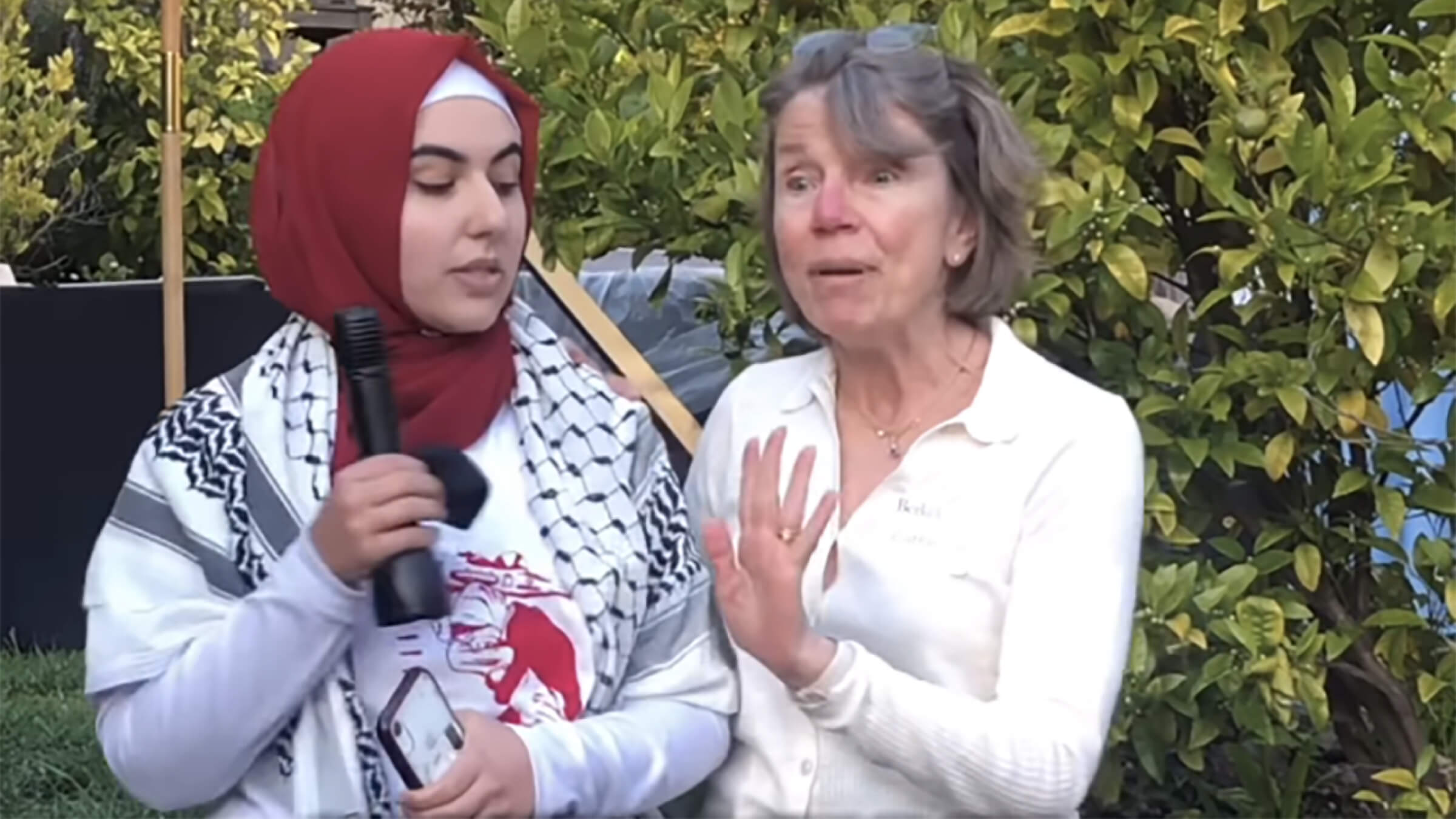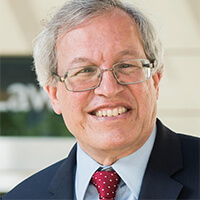‘This is not your house’: Anti-Israel protester disrupts Berkeley law dean’s backyard dinner, refuses to leave
“I am appalled and deeply disturbed by what occurred at Dean Chemerinsky’s home last night,” said UC Berkeley Chancellor Carol Christ

UC Berkeley law professor Catherine Fisk attempts to get law student Malak Afaneh to leave the home Fisk shares with her husband, Berkeley law Dean Erwin Chemerinsky, April 9, 2024. Image by Screenshot via Instagram
This article originally appeared in J, the Jewish News of Northern California.
What was meant to be a congratulatory spring dinner for graduating students at the home of UC Berkeley’s law school dean turned confrontational last night when a pro-Palestinian protester stood up with a microphone and began making a speech.
Erwin Chemerinsky and his wife, law school professor Catherine Fisk, were hosting the event for third-year law students in their backyard and asked the protester, who was a student and one of the registered guests, to leave.
According to a statement released today by Chemerinsky, around 60 students signed up to attend and were eating dinner when the disruption occurred.

“While guests were eating, a woman stood up with a microphone, stood on the top step in the yard, and began a speech, including about the plight of the Palestinians,” Chemerinsky said. “My wife and I immediately approached her and asked her to stop and leave. The woman continued. When she continued, there was an attempt to take away her microphone. Repeatedly, we said to her that you are a guest in our home, please stop and leave. About 10 students were clearly with her and ultimately left as a group.”
Video has circulated on social media that shows a woman identified as Malak Afaneh, who is a Berkeley law student and co-president of Berkeley Law Students for Justice in Palestine. She is also a law clerk at the Council on American-Islamic Relations.
The student group had called for a boycott of Chemerinsky’s dinner with a disturbing cartoon that showed the law school dean holding a fork and knife covered in blood.
“No dinner with Zionist Chem while Gaza starves,” it read.
‘You are guests in our house’
In the video clip, which shows 20 seconds of the incident, she is standing with a microphone and reading from her phone. Fisk approaches and grabs at her phone and the mic while putting her arm around her shoulder in what appears to be an attempt to move her aside.
“Leave,” Fisk says. “This is not your house, this is my house.”
Chemerinsky also intervenes. “Please leave our house,” he says loudly. “You are guests in our house.”
According to one student present at the event, the video doesn’t paint the whole picture. A Jewish third-year law student who was at the dinner said that the protesters, including Afaneh, were speaking and disrupting the event for quite a while before things escalated. They were at first politely asked to leave their home by Chemerinsky and Fisk, he said. The video shows only the end of the incident, after the protesters had been speaking there for three or four minutes, the student said.
“They did not leave when they were asked the first 20 or 30 times,” he said. He added that they finally left after Fisk said that while she was reluctant to call the police, she would do so if needed.
“I am enormously sad that we have students who are so rude as to come into my home, in my backyard, and use this social occasion for their political agenda,” he said.
He said students at the dinner were already on edge, as they expected some kind of protest — but outside, on the public sidewalk. Instead, it was in front of them.
“We mostly stared in a combination of awkwardness and disbelief,” he said. “I think people weren’t quite sure how they should respond.”
Another student who was present said she was not entirely surprised that something like this happened, considering that one of the tables had students she knew to be part of Berkeley Law Students for Justice in Palestine. She told J. she felt bad for Chemerinsky and Fisk.
“They’re just such good people and kind people, and don’t deserve this,” she said.
The Instagram posts calling for a boycott of the event and depicting Chemerinsky included a caption that read, “This dinner is the prime example of a normalization PR event that hopes to distract students from Dean Chem’s complicity and support for the genocide of the Palestinian peoples.”
“I never thought I would see such blatant antisemitism, with an image that invokes the horrible antisemitic trope of blood libel and that attacks me for no apparent reason other than I am Jewish,” he said in his statement.
Chemerinsky lamented the disruption of what was meant to be a welcoming, positive evening.
“I am enormously sad that we have students who are so rude as to come into my home, in my backyard, and use this social occasion for their political agenda,” he said.
“I am appalled and deeply disturbed by what occurred at Dean Chemerinsky’s home last night,” said Chancellor Carol Christ in a statement sent to J. “I have been in touch with him to offer my support and sympathy. While our support for Free Speech is unwavering, we cannot condone using a social occasion at a person’s private residence as a platform for protest.”
A free speech stalwart
Chemerinsky has largely been supportive of the rights of his students to voice their criticisms of Israel.
He spoke out against the trucks sent by the right-leaning Jewish organization Accuracy in Media, which drove around UC Berkeley in February displaying the names and photos of people that the organization accused of holding antisemitic views.
Chemerinsky also defended the right of law school clubs to bar Zionist speakers, although he disagreed with the policy.
In a 2022 op-ed in J., Chemerinsky wrote about the student groups at Berkeley Law that had added motions to their bylaws condemning Israel. “It is crucial that I stress that students have the right to take a position on this, like all issues, even if I disagree with them or find their views offensive,” he wrote at the time.
In that op-ed, however, he expressed concern over the idea of clubs banning Zionist speakers.
“It is very troubling to broadly exclude a particular viewpoint from being expressed,” he said. “Indeed, taken literally, this would mean that I could not be invited to speak because I support the existence of Israel, though I condemn many of its policies.”
His views on free speech at school were broad enough to include the posters targeting his April 9 dinner.
“I felt that though deeply offensive, they were speech protected by the First Amendment,” he said in the statement.
However, he drew the line at protests in his home.
“The dinners will go forward on Wednesday and Thursday,” he wrote. “I hope that there will be no disruptions; my home is not a forum for free speech. But we will have security present. Any student who disrupts will be reported to student conduct and a violation of the student conduct code is reported to the Bar.”





















